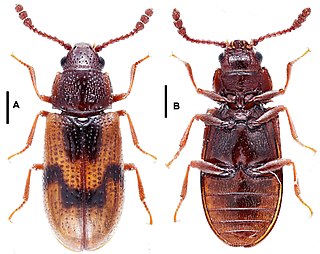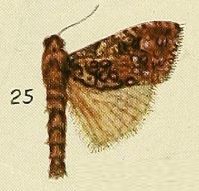
Aster is a genus of perennial flowering plants in the family Asteraceae. Its circumscription has been narrowed, and it now encompasses around 170 species, all but one of which are restricted to Eurasia; many species formerly in Aster are now in other genera of the tribe Astereae. Aster amellus is the type species of the genus and the family Asteraceae.

The Lamington National Park is a national park, lying on the Lamington Plateau of the McPherson Range on the Queensland/New South Wales border in Australia. From Southport on the Gold Coast the park is 85 kilometres (53 mi) to the southwest and Brisbane is 110 kilometres (68 mi) north. The 20,600 hectares Lamington National Park is known for its natural environment, rainforests, birdlife, ancient trees, waterfalls, walking tracks and mountain views. The park protects parts of the Eastern Australian temperate forests.

The International Code of Zoological Nomenclature (ICZN) is a widely accepted convention in zoology that rules the formal scientific naming of organisms treated as animals. It is also informally known as the ICZN Code, for its publisher, the International Commission on Zoological Nomenclature. The rules principally regulate:

The Pterophoridae or plume moths are a family of Lepidoptera with unusually modified wings, giving them the shape of a narrow winged airplane. Though they belong to the Apoditrysia like the larger moths and the butterflies, unlike these they are tiny and were formerly included among the assemblage called "microlepidoptera".

The Lymantriinae are a subfamily of moths of the family Erebidae. The taxon was erected by George Hampson in 1893.

Arthur Gardiner Butler F.L.S., F.Z.S. was an English entomologist, arachnologist and ornithologist. He worked at the British Museum on the taxonomy of birds, insects, and spiders.

Coleophora is a very large genus of moths of the family Coleophoridae. It contains some 1,350 described species. The genus is represented on all continents, but the majority are found in the Nearctic and Palaearctic regions. Many authors have tried splitting the genus into numerous smaller ones, but most of these have not become widely accepted.

Gracillariidae is an important family of insects in the order Lepidoptera and the principal family of leaf miners that includes several economic, horticultural or recently invasive pest species such as the horse-chestnut leaf miner, Cameraria ohridella.

Eupterotidae is a family of insects in the order Lepidoptera with more than 300 described species.

The Batrachedridae are a small family of tiny moths. These are small, slender moths which rest with their wings wrapped tightly around their bodies.

The Spilosomina are a subtribe of tiger moths in the tribe Arctiini, which is part of the family Erebidae.

The Thyatirinae, or false owlet moths, are a subfamily of the moth family Drepanidae with about 200 species described. Until recently, most classifications treated this group as a separate family called Thyatiridae.

Eois is a genus of tropical moths in the family Geometridae. It was first described by Jacob Hübner in 1818. Caterpillars of Eois species are most commonly green with darker markings, but species with fully dark caterpillars also exist. They are specialized feeders associated with Piperaceae species, with sparse additional records on Chloranthaceae species. Adults are typically small, with diverse wing shape, color and patterning across the genus.

Lamingtonium is the only genus in the family Lamingtoniidae, of the beetle superfamily Cucujoidea. It contains three species endemic to Australia. The holotype of the type species was collected on at Lamington National Park, Binna Burra, Queensland under the bark of a dead tree. The adults and larvae of two species have been found associated with basidiocarps of fungi belonging to the family Polyporaceae.
Radiarctia is a genus of moths in the family Erebidae from Afrotropics.
Pseudoradiarctia is a genus of moths in the family Erebidae from Afrotropics.

Gracillariinae are a subfamily of moths which was described by Henry Tibbats Stainton in 1854.

The Metarbelidae are a family of the Cossoidea also called the carpenter or goat moths, and is sometimes treated as a subfamily, Metarbelinae of the Cossidae. No synapomorphies are shared with the Cossidae based on adult morphology. The family Metarbelidae was first described by Embrik Strand in 1909.

Binna Burra is a rural locality in the Scenic Rim Region, Queensland, Australia. It borders New South Wales. In the 2021 census, Binna Burra had "no people or a very low population".
Eugene Gordon Munroe was a Canadian entomologist who discovered numerous species of insects. He worked for the Insect Systematics and Biological Control Unit, Entomology Division in Ottawa, Ontario, Canada.
















